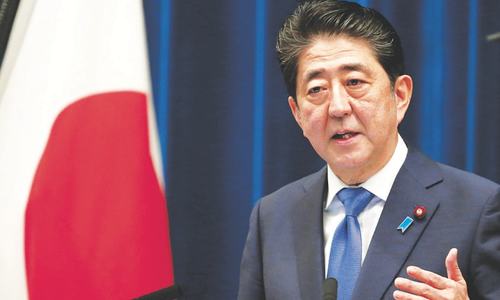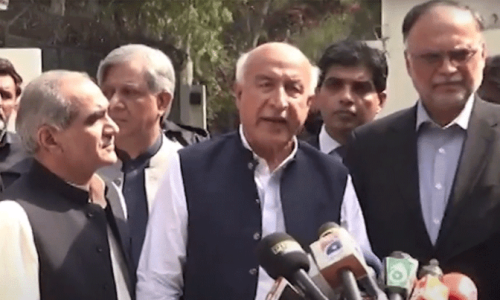Japan's former prime minister Shinzo Abe, the country's longest-serving leader, was pronounced dead on Friday afternoon, the hospital treating him confirmed, after he was shot at a campaign event.
“Shinzo Abe was transported to (the hospital) at 12:20pm. He was in a state of cardiac arrest upon arrival. Resuscitation was administered. However, unfortunately he died at 5:03pm,” said Hidetada Fukushima, professor of emergency medicine at Nara Medical University hospital.
Abe, 67, was delivering a stump speech with security present, but spectators were able to approach him fairly easily.
NHK quoted the suspect, identified as Tetsuya Yamagami, as telling police he was dissatisfied with Abe and wanted to kill him. He has since been taken into custody.
The suspect opened fire on Abe from behind with an apparently homemade gun as he spoke at a drab traffic island in the western city of Nara, Japanese media showed earlier.
Footage broadcast by NHK showed Abe standing on a stage when a loud blast was heard with smoke visible in the air.
Security officials were then seen tackling a man in a grey T-shirt and beige trousers.

It was the first assassination of a sitting or former Japanese premier since the days of prewar militarism in the 1930s.
Nara emergency services said he had been wounded on the right side of his neck and left clavicle.
His brother, Defence Minister Nobuo Kishi, had said earlier that Abe was getting blood transfusions.
Speaking before Abe's death was announced, incumbent Prime Minister Fumio Kishida condemned the shooting in the “strongest terms” while Japanese people and world leaders expressed shock at the violence in a country in which political violence is rare and guns are tightly controlled.
“Former prime minister Shinzo Abe was shot in Nara and I have been informed he is in a very grave condition,” PM Kishida had told reporters after arriving in Tokyo by helicopter from the campaign trail.
“It is a barbaric act during election campaigning, which is the foundation of democracy, and it is absolutely unforgivable. I condemn this act in the strongest terms.”
The attack had taken place shortly before noon in the country's western region of Nara, and “one man, believed to be the shooter, has been taken into custody”, government spokesman Hirokazu Matsuno earlier told reporters.
Several media outlets described 41-year-old Yamagami as a former member of the Maritime Self-Defence Force, the country's navy.
'A large bang'
Witnesses at the scene described shock as the political event turned into chaos.
“He was giving a speech and a man came from behind,” a young woman at the scene told NHK.
“The first shot sounded like a toy bazooka. He didn't fall and there was a large bang. The second shot was more visible, you could see the spark and smoke,” she added.
“After the second shot, people surrounded him and gave him cardiac massage.”
Abe was bleeding from the neck, witnesses said and photographs showed. He was reportedly initially conscious but subsequently lost consciousness, NHK reported.
Officials from the local chapter of Abe's Liberal Democratic Party said there had been no threats before the incident and that his speech had been announced publicly.
'Profoundly sad and shocking'
Abe, Japan's longest-serving prime minister, held office in 2006 for one year and again from 2012 to 2020, when he was forced to step down due to the debilitating bowel condition ulcerative colitis.
He is a hawkish conservative who pushed for the revision of Japan's pacifist constitution to recognise the country's military and has stayed a prominent political figure even after his resignation.
Japan has some of the world's toughest gun-control laws, and annual deaths from firearms in the country of 125 million people are regularly in single figures.
Getting a gun licence is a long and complicated process even for Japanese citizens, who must first get a recommendation from a shooting association and then undergo strict police checks.
Japan has seen “nothing like this for well over 50 to 60 years,” Corey Wallace, an assistant professor at Kanagawa University who focuses on Japanese politics, told AFP.
He said the last similar incident was likely the 1960 assassination of Inejiro Asanuma, the leader of the Japan Socialist Party, who was stabbed by a right-wing youth.
“But two days before an election, of a (man) who is so prominent ... it's really profoundly sad and shocking.”
He noted, too, that Japanese politicians and voters are used to a personal and close-up style of campaigning.
“This could really change. “
'Despicable attack'
When Abe's death was announced, the attack prompted international shock.
Prime Minister Shehbaz Sharif extended his condolences over Abe's death.
"He made invaluable contributions to the Pakistan-Japan relationship. Our prayers are with [the] bereaved family. At this difficult time, we stand in solidarity with the people of Japan," he said.
UN Secretary-General Antonio Gutteres said he was "deeply saddened" by the assassination. He said he would always remember his always remember "collegiality and commitment to multilateralism".
US State Secretary Antony Blinken voiced alarm over the shooting.
“This is a very, very sad moment,” Blinken told reporters at a G20 meeting in Bali, saying the United States was “deeply saddened and deeply concerned”.
Thailand's Prime Minister Prayut Chan-O-Cha was “very shocked” at Abe's shooting, the kingdom's foreign affairs minister said, describing the pair as friends.
Indian Prime Minister Narendra Modi said he was “deeply distressed” by the shooting of Abe, describing the former Japanese premier as a “dear friend”.
“Deeply distressed by the attack on my dear friend Abe,” Modi wrote on Twitter. “Our thoughts and prayers are with him, his family, and the people of Japan. “
British Prime Minister Boris Johnson said he was utterly appalled and saddened to hear about the “despicable attack”.
“My thoughts are with his family and loved ones,” he said on Twitter.
New Zealand PM Jacinda Ardern issued a statement, saying she was "deeply shocked".
"He was one of the first leaders I formally met when I became prime minister. He was deeply committed to his role, and also generous and kind. I recall him asking after the recent loss of our pet when I met him, a small gesture but one that speaks to the kind of person he is," she said.
"My thoughts are with his wife and the people of Japan. Events like this shake us all to the core,” Ardern said.
Australian Prime Minister Anthony Albanese termed the incident shocking.
"Shocking news from Japan that former PM Shinzo Abe has been shot — our thoughts are with his family and the people of Japan at this time," he tweeted.
Taiwanese President Tsai Ing-Wen also condemned the incident in a Facebook post.
"I believe everyone is as surprised and sad as I am. Taiwan and Japan are both democratic countries with rule of law. On behalf of my government, I would like to severely condemn violent and illegal acts," he said.
The president added that “former Prime Minister Abe is not only a good friend of mine, but also a staunch friend of Taiwan's. He has supported Taiwan for many years and spared no effort to promote the progress of Taiwan-Japan relations".
European Council President Charles Michel said he was “shocked and saddened by [the] cowardly attack”.
Abe was “a true friend, fierce defender of multilateral order & democratic values”, Michel tweeted.
“(The) EU stands with people of Japan and Fumio Kishida in these difficult times.”
Likewise, European Commission President Ursula von der Leyen tweeted: "Dear @AbeShinzo, stay strong! Our thoughts and prayers are with your family and the people of Japan.”
















































